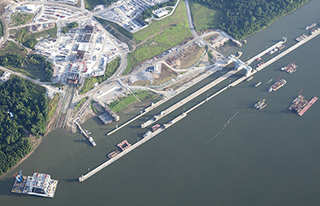President Obama signed into law Friday a catch-all appropriations bill for fiscal year 2016 that includes a record level of funding to improve river navigation infrastructure, and significant sums for projects at U.S. ports.
The maritime funding was included in a $1.15 trillion omnibus appropriations bill that combines 12 annual appropriations bills to fund government programs through next September. Under pressure to avoid a government shutdown if it didn’t meet end-of-year deadlines, Congress rushed to complete work on the measure before adjourning for the holidays.
The new law boosts defense and domestic spending and lifts a ban on U.S. oil exports that dates to the 1970s. For maritime interests, it provides the highest-ever amount of federal support for the U.S. Army Corps of Engineers’ Civil Works program, which oversees the nation’s lock and dam network and for years has had to maintain, repair and modernize this river system with inadequate and uneven funding.
It allocates nearly $6 billion to the Corps, a 27% increase above the president’s budget request of $4.7 million. Projects funded under the Inland Waterways Trust Fund (IWTF), which is financed by federal funds and a 29-cent per gallon diesel tax on the barge industry, will get a record-level funding of $405 million for priority navigation projects. This is a 75% increase over the administration’s $232 million request.
In addition, money for operations and maintenance of navigation infrastructure will get nearly a 16% boost above the initial request.
There are two key factors at play in the higher levels for inland navigation, according to Mike Toohey, president and CEO of the Waterways Council, an industry group that is pushing for strong funding levels for the Corps.
He said a nine-cent increase in diesel tax, which went into effect in April, has brought an infusion of money into the IWTF, and the long awaited passage of a new federal water resources in 2014, has set certain mandates and policy changes that Congress must follow.
The Water Resources Reform and Development Act of 2014 (WRRDA) freed up inland trust fund revenues for other projects by federalizing the costs of building the over-budget and long-delayed Olmsted Locks and Dam on the Ohio River between Illinois and Kentucky, and setting targets for the Harbor Maintenance Fund expenditures, Toohey explained.
“The Appropriations Committees have supported the WRRDA targets, Olmsted cost sharing and full utilization of revenues flowing into the Trust Fund from the nine-cent user fee increase,” he said.
Congress can’t direct spending for specific projects, Toohey added, as the actual amounts will be decided by the Corps. But funding of projects should be at full capability of the Corps to expend the funds, including $268 million for Olmsted, $60 million for construction of the Lower Monongahela River Locks and Dams 2,3 and 4 locks in Pennsylvania, $48 million for Kentucky Lock and Dam on the Tennessee River 20 miles east of Paducah, Kentucky, and $29 million for Chickamauga Navigation Lock replacement project, seven miles upstream of Chattanooga, Tenn.
Toohey said that hitting record levels for navigation funding this year puts the program in a strong funding position for the future. “The trend is good,” he said.
For ports, the spending bill provides $1.2 billion for jetty and maintenance dredging, and meets annual port funding goals set by WRRDA. This is an important step as industry groups complained that Congress and the president had ignored WRRDA funding targets during the first year of the law’s implementation.
The bill includes an increase for the EPA’s Diesel Emissions Reduction Act grants program, which will help ports reduce air emissions from their operations, and offers the same level funding for port security grants. The bill also directs the Department of Homeland Security to assess the risks of cyberattacks at the nation’s largest ports - such as Los Angeles, New York and Houston - and make recommendations on how to mitigate these risks.
“We have ignored the cybersecurity of the networks managing our ports long enough,” said Rep. Janice Hahn, D-Calif., who sought the risk report.




